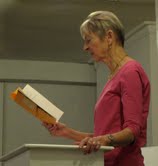Singing in Yoghurt 
Singing in yoghurt – chanter en yaourt –
An ignocent pretends to get you through this:
Oh, it’s Pas de lieu Rhône connu
It’s Paddle your own canoe.
Pas de lieu Rhône connu?
No place known in Rhône? WHAT?
“There was a hypoon, and the ship went underboard.”
So I go “Lorem ipsum dolor sit amet.”
You need an ignocent.
Yoghurt on the macaroni.
Or macaroni on the yoghurt.
From Flemish, copyright 2013 by Caroline Knox. Reprinted with permission of Wave Books and the author (http://www.wavepoetry.com/products/flemish)
“Singing in Yoghurt” is a short poem about the use of language; it also acts as and sounds like a song. Recently when I read it I got this audience question: How did you put the poem together? The answer is that the five ingredients in the poem are examples of the sort of activity that I try to put into poetry. They all belong together. The poem got written fast. It tries to remind us that we don’t always know just what we’re writing about or singing about, and that this may not be a bad thing. Here are the ingredients.
1. I had been reading a wonderful book, The Secret Life of Words, by Henry Hitchings (New York, 2008, 337). Hitchings describes a global trend and practice of poets and songwriters called singing in yoghurt – chanter en yaourt. Poets compose in their own languages, but they include words from other languages, even though they may not know exactly what the words mean. They don’t care, they like it. It sounds beautiful, cool, sophisticated, original. This seems to me endearing and healthy.
2. A friend of mine was asked to be a museum docent. She did all her homework, but she left some things out and got some facts wrong. She declared herself an ignocent.
3. My middle-school French teacher wrote this on the board:
Pas de lieu Rhône connu
and she made the whole class say it very fast. It sounded stupid and it was – it’s nonsense in French, but it’s just fine in English: Paddle your own canoe!
4. I was driving a carpool of little kids. The girl next to me in the front seat (she had never seen the ocean) was telling me the plot of a Disney movie. She said, “There was a hypoon, and the ship went underboard.” Marvelous girl! Two brand new words – hypoon and underboard – full of drama and fear.
5. Up to here I’ve been praising new, ingenious, and nutty uses of language. I conclude the poem with Lorem ipsum dolor sit amet. The speaker is saying this, but as all typesetters and graphics people know, the phrase is a scumbled piece of written Latin which has come to mean “This is where the content in our text will go, as soon as we get it. Please be patient.” It’s a practical, charming, and generous work custom – I wish all professions could be so thoughtful! And finally, macaroni is combined with yoghurt because macaronic poetry is a form which uses two languages.
 Caroline Knox’s seventh collection, Nine Worthies, appeared from Wave Books in September 2010. Her sixth, Quaker Guns (Wave 2008), received a Recommended Reading Award 2009 from the Massachusetts Center for the Book. The term in the poem “Singing in Yoghurt” refers to the global pop-rock phenomenon of introducing foreign and perhaps not understood words into one’s poetry and song (Henry Hitchings, The Secret Life of Words, Farrar Straus 2008, 337).
Caroline Knox’s seventh collection, Nine Worthies, appeared from Wave Books in September 2010. Her sixth, Quaker Guns (Wave 2008), received a Recommended Reading Award 2009 from the Massachusetts Center for the Book. The term in the poem “Singing in Yoghurt” refers to the global pop-rock phenomenon of introducing foreign and perhaps not understood words into one’s poetry and song (Henry Hitchings, The Secret Life of Words, Farrar Straus 2008, 337).